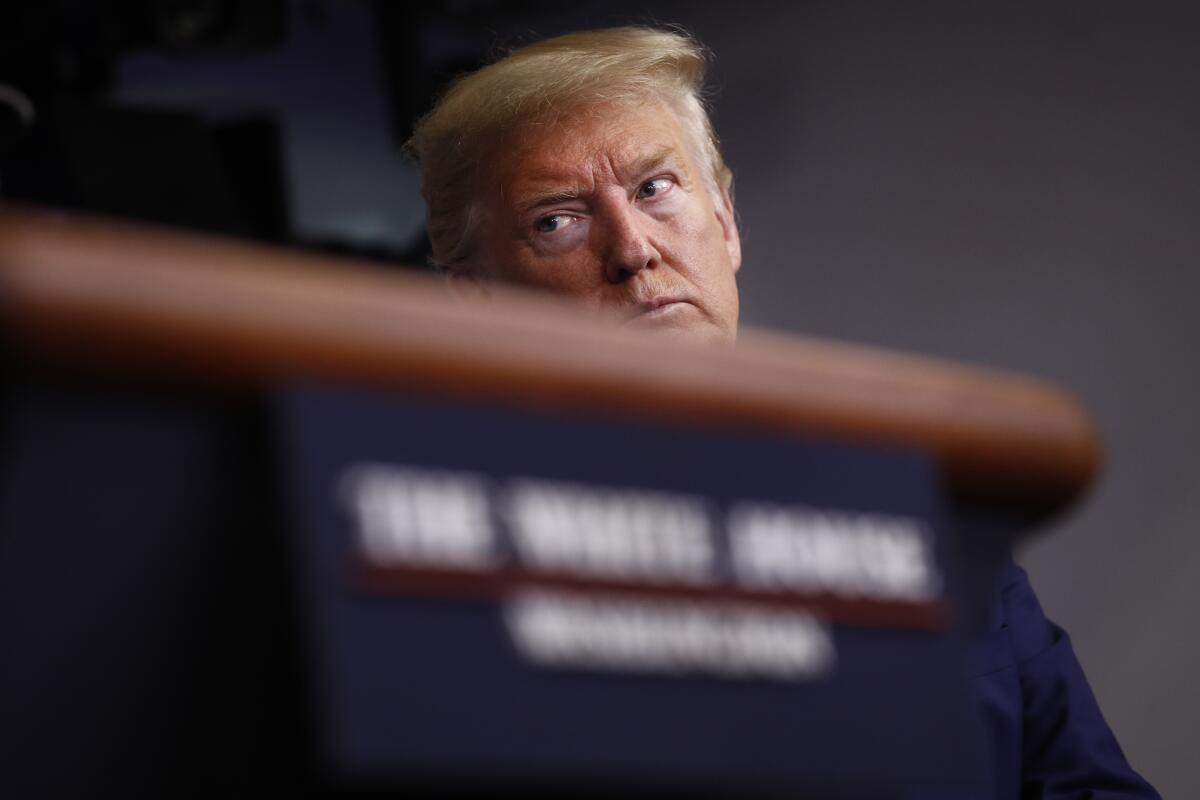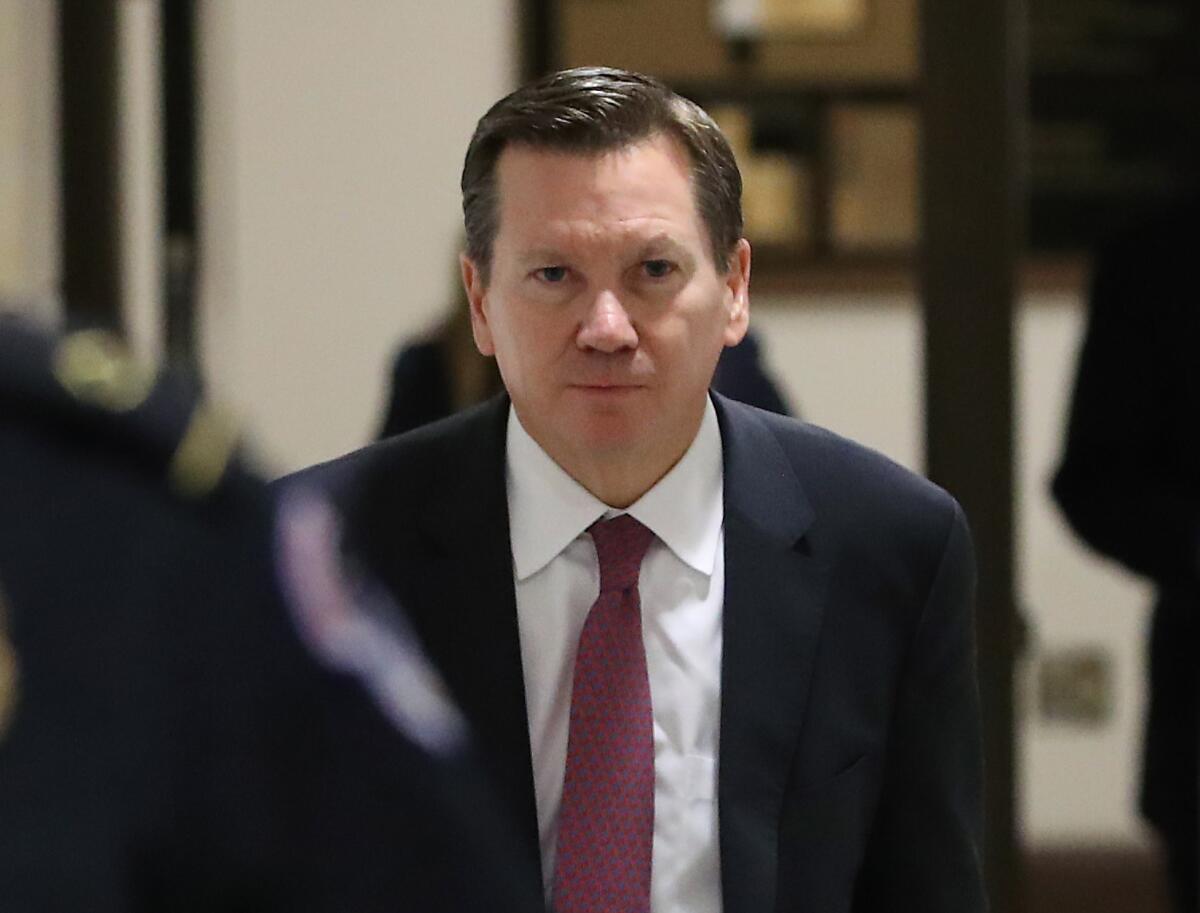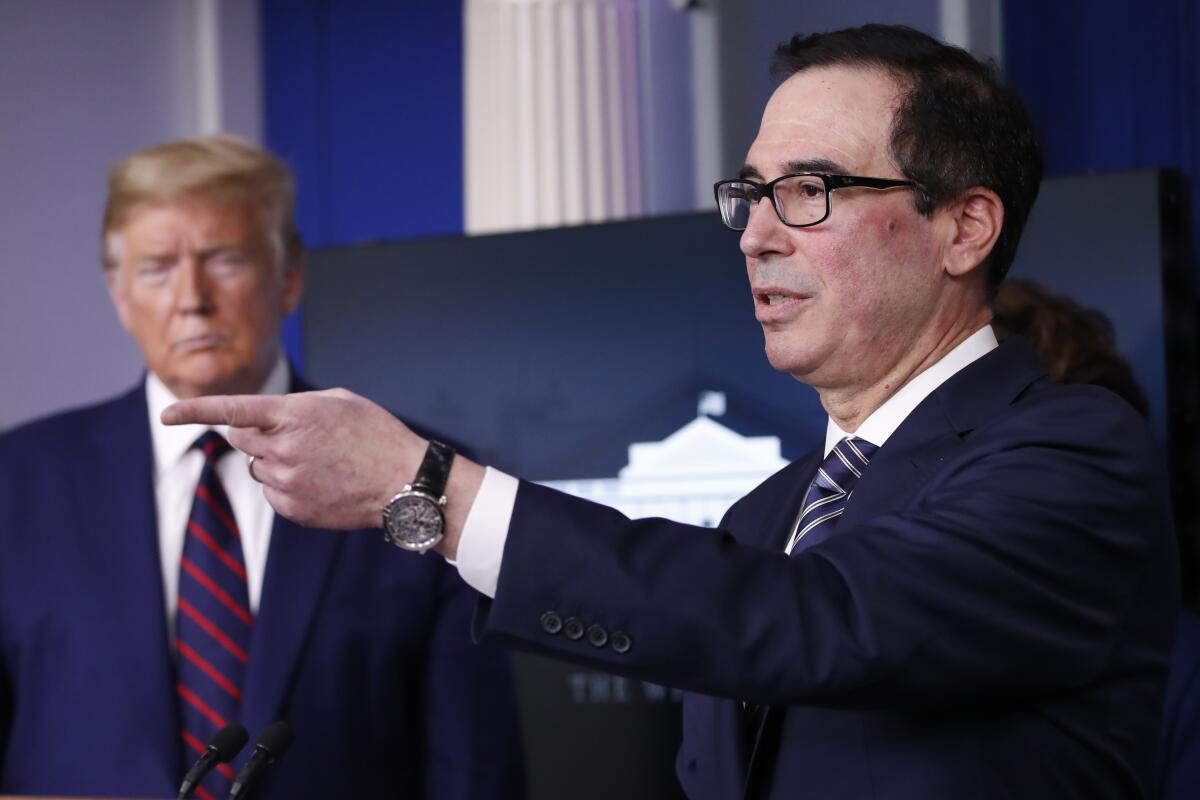Trump fires impeachment adversary and resists oversight of trillions to be spent for coronavirus relief

- Share via
WASHINGTON — President Trump continued to fight against independent oversight of his administration, firing a watchdog who played a pivotal role in his impeachment while moving to limit supervision of how trillions of dollars are spent for relief against the coronavirus pandemic.
The decisions raised alarms across Washington over the weekend as the federal government prepared to dole out a record amount of money that Congress approved to prop up the economy amid a national medical crisis that has killed more than 8,000 Americans and infected more than 300,000.
With the nation focused on the pandemic, Trump signaled that he still nurtured grudges from his recent impeachment. Late Friday night, he notified Congress that he would fire Michael Atkinson, the inspector general for U.S. intelligence agencies who last year disclosed to lawmakers a whistleblower’s complaint against the president.
The revelation that Trump asked Ukraine’s government to investigate his Democratic rival Joe Biden set in motion his impeachment by the House. Trump has fumed over Atkinson’s role in the saga ever since, despite being acquitted Feb. 5 by the Republican-controlled Senate.
“I thought he did a terrible job,” Trump vented during a White House news conference on Saturday. He called the whistleblower complaint “a fake report,” even though its core allegations were substantiated. “He’s a total disgrace.”
Rep. Adam B. Schiff (D-Burbank), the chairman of the House Intelligence Committee who led the case for impeaching Trump, called the president’s decision to fire Atkinson an example of “retribution against a distinguished public servant for doing his job.”
“It undermines the transparency and oversight the American people expect of their government and, in its absence, will undoubtedly lead to even greater corruption in the administration,” he said in a statement.

Separately, Trump said he would nominate Brian Miller, a White House lawyer, as the special inspector general for overseeing how the Treasury Department disperses $500 billion in emergency loans to corporations. The role is one of several that Congress mandated to ensure accountability for $2 trillion in coronavirus aid signed into law by Trump.
Miller previously served for almost a decade as the inspector general for the General Services Administration, the federal government’s property and supplies manager. He received good marks there, but Trump’s choice still drew criticism.
“To nominate a member of the president’s own staff is exactly the wrong type of person to choose for this position,” Senate Minority Leader Charles E. Schumer (D-N.Y.) said in a statement. “Given this administration’s total disregard for the rule of law and basic ethics, strong oversight is more important during the Trump presidency than at any other time in American history.”
Although every president has squirmed under the microscope of independent oversight, Trump has fought back in an especially bitter fashion, equating attempts at accountability with personal insults. He described both the investigation of Russia’s role in his election and the impeachment process as “witch hunts,” and already he’s applied that moniker to plans by House Speaker Nancy Pelosi (D-San Francisco) for a bipartisan committee to scrutinize his administration’s response to the coronavirus.
“Here we go again,” Trump said during a White House briefing on Thursday. “You see what happens. It’s witch hunt after witch hunt after witch hunt.”
During the same briefing, Treasury Secretary Steven T. Mnuchin, who negotiated the $2-trillion relief package with Democratic congressional leaders, said that the administration would be amenable to the supervision the deal required. A former investment banker, Mnuchin has extensive power under the new law to determine how loans are distributed to companies hammered by the economy’s virtual shutdown.
“We support full transparency,” he said. “Taxpayers should understand how we’re going to support this economy and jobs.”

Yet when the president signed the relief law, he issued a statement asserting that he could limit how much information the Treasury’s newly created special inspector general for pandemic recovery could share with lawmakers.
The law said Congress must be informed “without delay” if administration officials refuse to provide information. But in his signing statement, Trump said, “I do not understand, and my administration will not treat, this provision as permitting the [inspector general] to issue reports to the Congress without the presidential supervision required.”
The statement recalled Trump’s ultimately futile effort last year to prevent Atkinson from giving Congress the whistleblower complaint about Trump’s conversation with the Ukrainian president.
Watchdog groups viewed Trump’s decisions to remove Atkinson and tap Miller to be an overseer as bad omens at a time when taxpayer money is gushing into the private sector to keep the economy on life support during the pandemic.
“This will be the end of oversight if Trump gets away with this,” Danielle Brian, executive director of the nonpartisan Project on Government Oversight, said of Atkinson’s firing. “What whistleblower is going to come forward if this is how everything plays out?”
Trump said he would announce a new inspector general — a position charged with ferreting out waste, fraud and abuse within the nation’s intelligence agencies — at a later date. While Democrats swiftly condemned his firing of Atkinson, Republicans hesitated to publicly criticize the president. However, one influential member of the Senate, which must confirm a replacement, demanded more information.
Sen. Charles E. Grassley of Iowa, who throughout his long career championed whistleblowers, said in a statement that inspectors general “help drain the swamp, so any removal demands an explanation.” He added that “more details are needed from the administration.”
The president has shown a penchant for placing loyalists in high-ranking intelligence roles. He recently appointed Richard Grenell, the outspoken U.S. ambassador to Germany, as the acting director of national intelligence and nominated Rep. John Ratcliffe, a Texas Republican who fiercely defended Trump during impeachment proceedings, as a permanent replacement. Ratcliffe’s nomination is pending in the Senate, where even Republicans are skeptical of his suitability.
Atkinson’s removal is the latest in a string of retaliatory firings by Trump since his impeachment and acquittal. He removed Lt. Col. Alexander Vindman, the Ukraine expert on the National Security Council who testified during House hearings, as well as Vindman’s twin brother. He also fired Gordon Sondland, the U.S. ambassador to the European Union, another key witness.
Vindman had told lawmakers he was disturbed by Trump’s conversation last summer with the Ukrainian president, Volodymyr Zelensky, and reported his concerns to a superior. Sondland testified that he believed Trump’s request for Ukraine to announce an investigation of Biden was part of a quid pro quo in exchange for U.S. military aid to the Eastern European country, which is at war with Russian-backed separatists. Both appeared before Congress after receiving subpoenas.
Another decision by Trump on Friday threatened to roil the newly formed Pandemic Response Accountability Committee, a panel of inspectors general intended to coordinate oversight of the $2 trillion in relief, just as it is getting underway.
Glenn Fine, the acting inspector general for the Department of Defense, was placed in charge of the committee, but Trump said Friday that he would nominate a permanent replacement for Fine at the Pentagon. If that nominee — Jason Abend, a senior policy advisor for U.S. Customs and Border Protection — is approved by the Senate, Fine would have to leave his Pentagon post and give up leadership of the oversight committee.
Michael Horowitz, the Justice Department inspector general who plays a leadership role among his counterparts in other federal agencies, would have to choose a new chief for the panel. In a statement early Saturday morning, Horowitz said the pandemic response would continue to receive close scrutiny.
He wrote, “The inspector general community will continue to conduct aggressive, independent oversight of the agencies that we oversee.”
More to Read
Get the L.A. Times Politics newsletter
Deeply reported insights into legislation, politics and policy from Sacramento, Washington and beyond. In your inbox three times per week.
You may occasionally receive promotional content from the Los Angeles Times.











